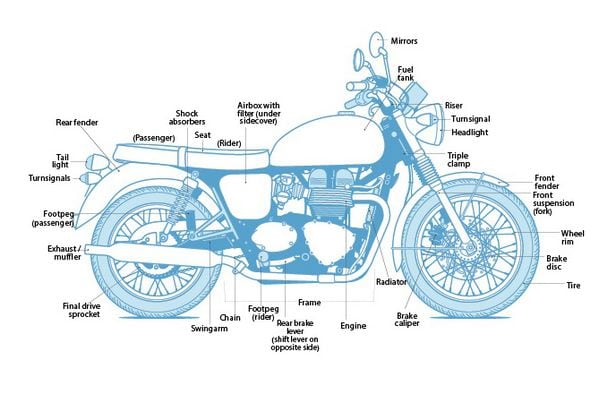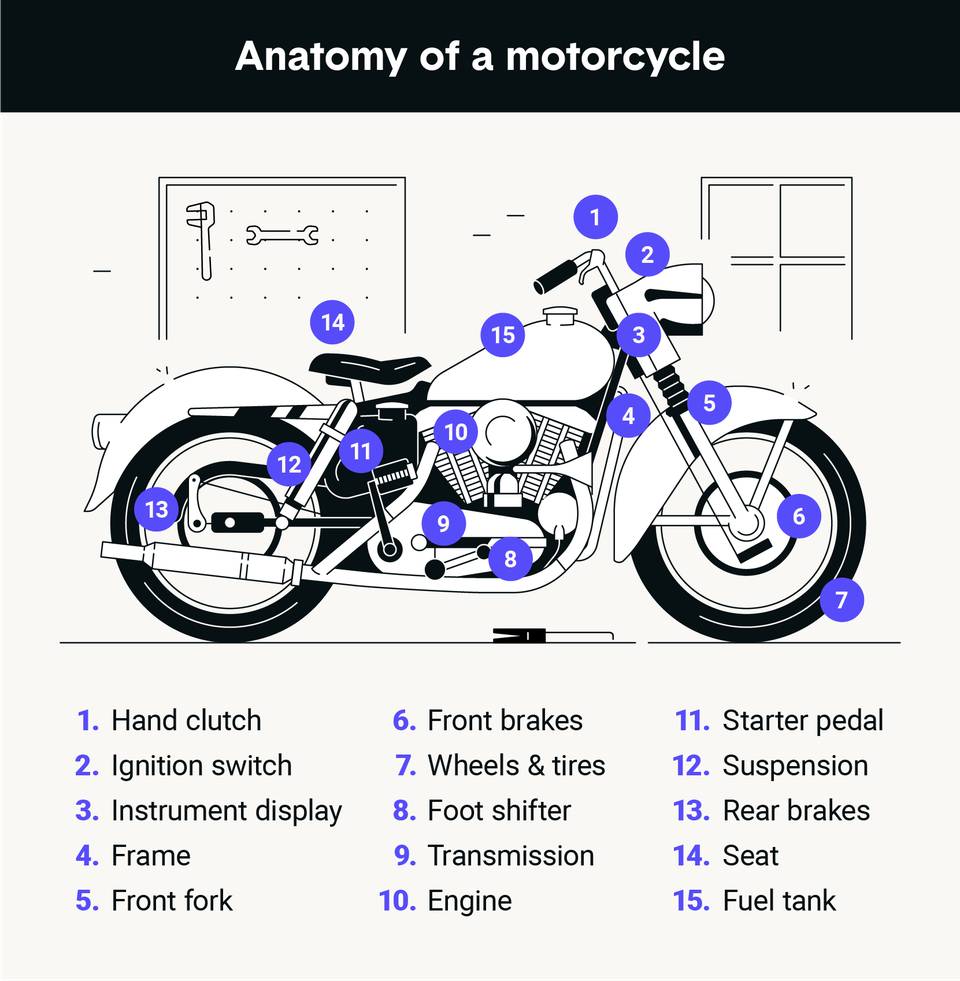Optimize Your Speed with High-Efficiency OEM Parts New Zealand
Optimize Your Speed with High-Efficiency OEM Parts New Zealand
Blog Article
Discover the Vital Motorcycle Components You Need for Optimal Performance
Understanding the important components of a bike is fundamental for achieving peak efficiency. Each part, from the engine to the braking system, plays an important duty in overall functionality and safety and security. Regular maintenance can stop unexpected failures and boost the riding experience. Many cyclists overlook the details of these systems. Uncovering how they interact can lead to a more efficient adventure. What vital components should every cyclist focus on?
The Engine: The Heart of Your Motorbike
The engine functions as the core element of a motorcycle, driving its performance and specifying its capabilities. It is in charge of transforming fuel right into mechanical power, which powers the bike onward. Different kinds of engines are used, consisting of single-cylinder, V-twin, and inline setups, each offering unique features suited for various riding objectives and styles. The engine size, usually determined in cubic centimeters (cc), significantly affects efficiency, with larger engines generally supplying more power and torque.Furthermore, the engine's style and modern technology, such as fuel shot systems or air-cooling versus liquid-cooling, influence efficiency and dependability. Maintenance is essential for peak procedure; aspects like routine oil modifications and monitoring spark plugs warranty durability. Riders typically take into consideration an engine's responsiveness and smoothness, as these features improve the overall riding experience. Eventually, the engine continues to be a critical component that specifies not only the bike's performance however also the motorcyclist's connection to the equipment.
The Transmission: Moving Gears Efficiently
The transmission plays a necessary role in a motorbike's performance, specifically in the technicians of equipment moving. Recognizing just how to change gears efficiently can enhance the overall riding experience, while routine upkeep guarantees peak performance. Proper focus to these facets can significantly influence the longevity and performance of the motorbike.

Gear Shifting Mechanics
Smooth gear changing is important for suitable motorbike efficiency, substantially impacting both acceleration and control. The technicians of gear changing involve the communication between the clutch, equipment bar, and transmission system. When a motorcyclist involves the clutch, it disengages the engine from the transmission, enabling a gear adjustment without harming the components. A well-timed launch of the clutch, incorporated with exact activity of the gear lever, helps with a smooth change in between gears. This procedure guarantees that the engine operates within its best power band, boosting performance. Bike Parts Wellington. Additionally, understanding the equipment proportions and their effect on speed and torque can aid cyclists make educated choices throughout changes, eventually contributing to a much more pleasurable and receptive riding experience
Upkeep Tips Significance
Regular upkeep plays a necessary duty in guaranteeing that the transmission system runs efficiently, permitting smooth gear changes. On a regular basis checking and transforming the transmission fluid is vital, as old liquid can bring about boosted friction and wear. Furthermore, checking the clutch for wear warranties peak interaction and disengagement, protecting against slippage during gear adjustments. Lubrication of relocating components is similarly crucial to decrease rubbing and boost efficiency. Motorbike proprietors must also check for leaks and unusual noises, as these can show underlying concerns. By adhering to these maintenance suggestions, riders can lengthen the lifespan of their transmission system, ensuring that equipment changes continue to be smooth and adding to the overall performance of their motorbike.
The Braking System: Ensuring Safety And Security on Every Ride
Braking systems are fundamental elements that straight affect a motorbike's safety and security and performance. They consist of numerous components, including brake pads, blades, calipers, and hydraulic lines, all working with each other to ensure reliable deceleration. The sort of stopping system-- typically either disc or drum-- influences responsiveness and stopping power.Regular upkeep is vital to maintain peak performance; used brake pads can lead to decreased efficiency and increased stopping distances. In addition, the top quality of brake fluid should be kept track of, as it can soak up wetness over time, compromising stopping efficiency.Riders need to likewise take into consideration the significance of anti-lock stopping systems (ABDOMINAL MUSCLE), which protect against wheel lockup throughout abrupt quits, enhancing general safety and security. Effectively working brakes are not nearly quiting; they instill confidence in the biker, permitting for much safer navigating through numerous terrains. Eventually, a trustworthy braking system is crucial for appreciating every ride with comfort.
The Suspension: Enhancing Convenience and Control
A well-functioning suspension system substantially adds to a motorbike's general performance, enhancing the performance of the stopping system. The suspension plays a significant role in absorbing shocks from unequal surfaces, assuring a smoother experience while maintaining tire contact with the road. This contact is vital for both stability and control, allowing motorcyclists to browse corners with confidence and precision.Different sorts of shock absorber, such as telescopic forks or mono-shocks, offer differing degrees of convenience and handling. Correctly tuned suspension enhances responsiveness, offering the motorcyclist with an extra linked feeling to the motorbike. Normal maintenance checks are essential to determine the suspension parts, including springs and dampers, are operating at their finest. An effective suspension system not just elevates the riding experience however additionally adds to the longevity of various other motorcycle parts by lessening deterioration. As a result, spending in quality suspension is important for any type of severe motorcycle lover.
The Tires: Connecting You to the Roadway
Tires play a vital function in a motorbike's performance, functioning as the main link between the cyclist and the road. Comprehending the various kinds of tires offered can significantly influence taking care of and safety and security. In addition, normal maintenance is crucial to ensure peak tire efficiency and durability.
Tire Enters Explained
Just how do various tire types influence a motorbike's performance? Tire kinds play an essential duty in determining a motorbike's grip, handling, and stability. Sporting activity tires, designed for high efficiency, deal improved grip and responsiveness on paved roads, making them excellent for racing and aggressive riding. On the other hand, exploring tires prioritize durability Resources and comfort, offering a smoother trip for long-distance travel. Off-road tires, defined by their rugged step patterns, excel in grip on unpaved surfaces, appropriate for experience lovers. Furthermore, dual-sport tires mix features from both off-road and on-road categories, providing to flexible riding requirements. Eventually, selecting the right tire type is essential for enhancing efficiency, ensuring safety, and improving the general riding experience.
Upkeep Tips Offered
While riding when driving, keeping ideal tire problem is vital for safety and efficiency. On a regular basis checking tire stress is necessary, as under-inflated tires can lead to inadequate handling and raised wear. It is recommended to check step deepness frequently; worn tires compromise hold and security. On top of that, bikers ought to look for signs of damages, such as bulges or splits, which can indicate the need for replacement. Revolving tires occasionally assures also wear, enhancing long life. Maintaining tires clean from debris and preventing extreme aesthetics can lengthen their life expectancy. Finally, keeping correct alignment and balance contributes to peak efficiency, minimizing anxiety on various other bike parts. Following these maintenance ideas will greatly boost the general riding experience.
The Fuel System: Sustaining Efficiency and Performance
The fuel system plays a crucial role in taking full advantage of a motorcycle's performance and effectiveness, as it ensures the optimum distribution of gas to the engine. It makes up several critical elements, including the gas tank, fuel pump, gas filter, and gas injectors or carburetor. Each component needs to work properly to ensure a effective and smooth ride.The gas tank shops gas and provides it to the engine using the fuel pump, which generates the required pressure. A gas filter prevents pollutants from going into the engine, while the injectors or carburetor mix fuel with air for combustion.Proper upkeep of the fuel system is crucial; a clogged up filter or malfunctioning injector can cause reduced efficiency and boosted gas usage. By confirming that the gas system operates effectively, bikers can take pleasure in improved throttle feedback, far better fuel economic situation, and on the whole boosted riding experience.
The Electrical System: Powering Your Experience
An effective electric system is vital for the total functionality and safety and security of a motorbike, as it powers crucial components such as the ignition, lighting, and different digital systems. This system consists of the battery, which stores energy, and the generator, responsible for generating power while the engine runs. The circuitry harness links these components, making certain reliable power distribution.Additionally, integrates secure the system from overloads, while relays assist manage high-current gadgets with low-power signals. A well-kept electric system boosts performance by guaranteeing smooth begins and regular operation of lights and signals, essential for cyclist visibility and safety.Regular checks of the you could look here battery's fee and connections are vital for preventing electric failures. Cyclists should additionally evaluate wiring for wear and tear, making sure all components function ideally. Eventually, a robust electric system contributes considerably to the total efficiency and reliability of the motorbike.
Frequently Asked Concerns
Exactly how Frequently Should I Change My Motorbike's Battery?
The frequency of motorbike battery replacement depends on usage and upkeep (Motorcycle Parts Auckland). Normally, batteries must be replaced every 3 to five years. Normal checks can assist recognize when a substitute is necessary for peak efficiency
What Devices Do I Required for Fundamental Bike Maintenance?
For standard bike upkeep, one calls for necessary tools such as an outlet collection, wrenches, screwdrivers, pliers, tire stress gauge, and a torque wrench. These devices help with efficient maintenance and ensure the bike runs effectively and securely.
How Can I Boost My Bike's The rules of aerodynamics?
To boost motorbike aerodynamics, one ought to consider adjusting fairings, using windscreen expansions, enhancing body placement, and reducing total weight. These modifications assist lessen drag, boosting security and gas effectiveness during trips.
What Are the Indications of a Failing Electrical System?
Indicators of a stopping working electric system include lowering lights, trouble beginning, uneven instrument readings, check out this site and blown fuses. Motorcycle Spares Christchurch. Uncommon scents or corrosion around battery terminals may likewise indicate underlying problems requiring instant focus for safety and efficiency

Exactly how Do I Select the Right Oil for My Motorbike?
When choosing oil for a motorcycle, one should take into consideration the maker's specs, thickness rankings, and the type of riding. Additionally, synthetic versus traditional oil can affect efficiency and engine security, influencing the decision substantially. The engine size, normally gauged in cubic centimeters (cc), substantially affects efficiency, with bigger engines typically offering even more power and torque.Furthermore, the engine's layout and technology, such as gas shot systems or air-cooling versus liquid-cooling, affect efficiency and reliability. A well-functioning suspension system greatly contributes to a motorcycle's overall efficiency, complementing the performance of the stopping system. The gas system plays a crucial role in maximizing a motorcycle's performance and performance, as it guarantees the ideal delivery of gas to the engine. A fuel filter stops impurities from going into the engine, while the injectors or carburetor mix fuel with air for combustion.Proper maintenance of the gas system is crucial; a clogged up filter or malfunctioning injector can lead to reduced efficiency and enhanced gas consumption. A well-kept electrical system boosts efficiency by making sure smooth starts and regular operation of lights and signals, important for cyclist visibility and safety.Regular checks of the battery's fee and connections are essential for avoiding electric failures.
Report this page